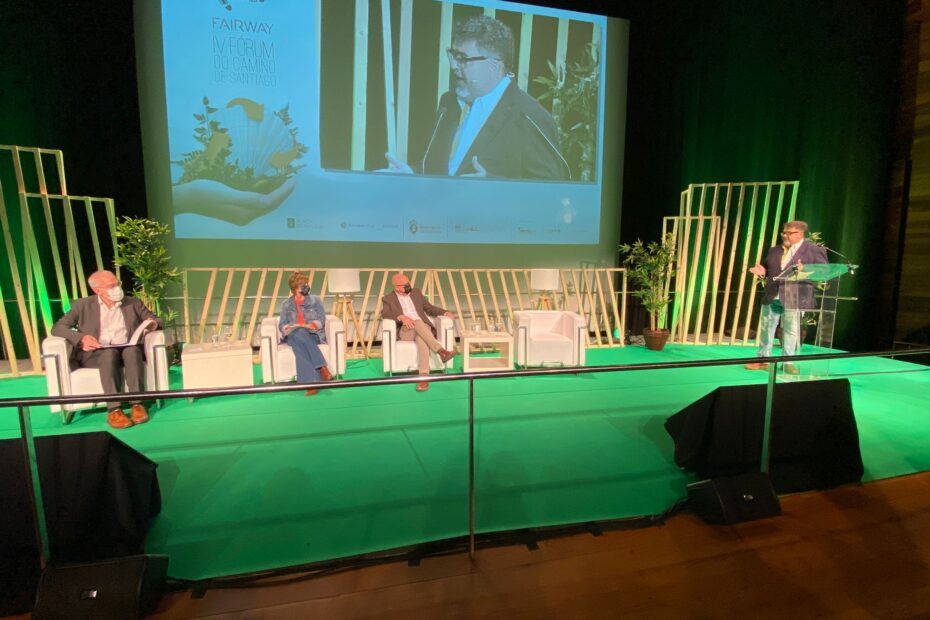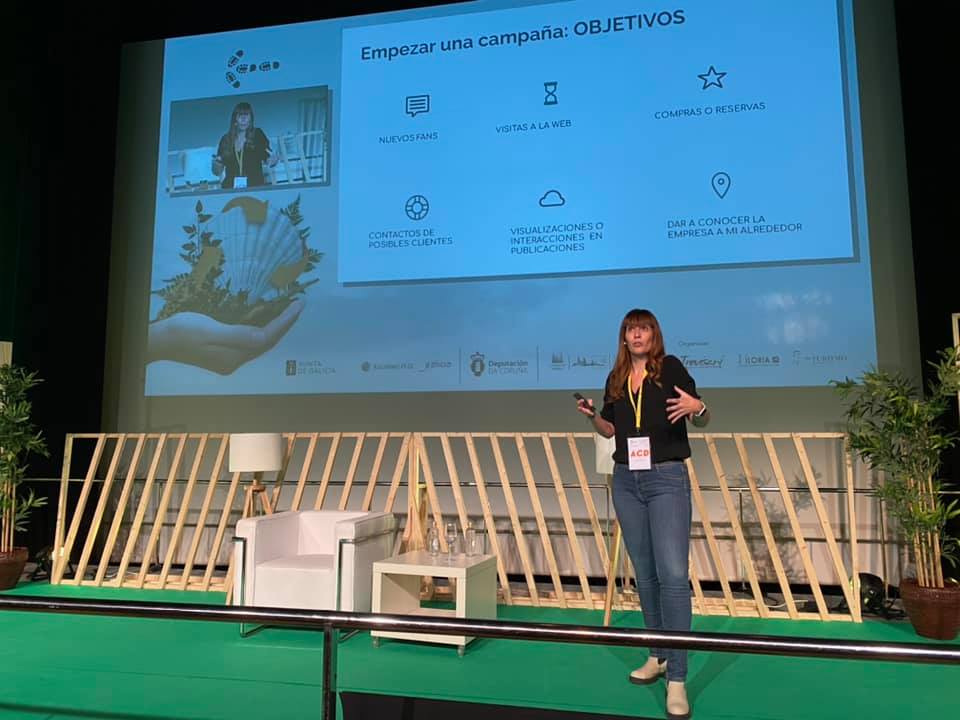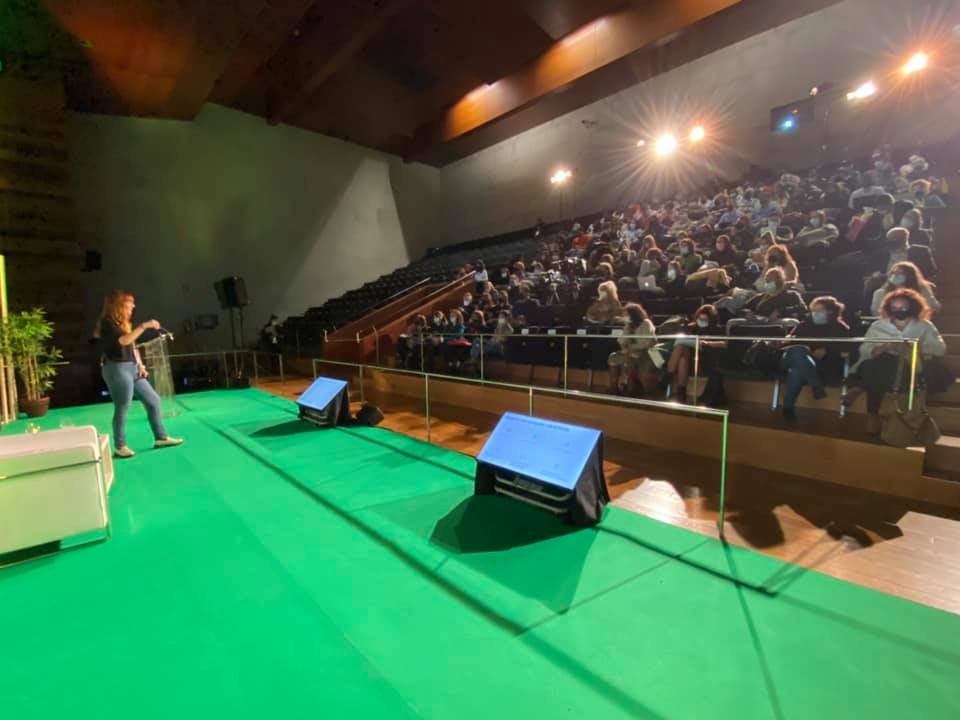Fairway, the 4th Forum on the Camino de Santiago, began its more professional aspect on Monday in Santiago’s Congress Hall. It started with the opening conference featuring the participation of the Director of the Galician Tourism Agency, Nava Castro; the Vice-president of A Coruña Provincial Council, Xosé Regueira, Santiago’s councillor for the Mayor’s Office, Institutional Relations and Tourism, Gumersindo Guinarte.
The representatives of the three administrations spoke about Tourism and Sustainability in a session moderated by Tono Mugico, Co-director of Fairway and CEO of Mr Turismo, who expressed his appreciation for the three institutions’ commitment to this 4th Forum event. In this regard, he highlighted “the capacity of the administrations and different fields, which combined forces to promote the event, thereby showing that the Camino is above all other considerations and requires breadth of vision.” This idea was repeated by the different representatives in their respective presentations, stressing the tourist sector’s importance as an economic driving force.
Pointing to the theme of sustainability, Nava Castro highlighted the fact that the Camino should be a sustainable experience that satisfies the pilgrims’ demands, in addition to continue being consolidated as a safe destination. In order to attain this balance, she underlined the initiatives that the Galician Government is implementing in this regard. For example, she mentioned measures related to accessibility, energy efficiency and respect for the environment, as well as accessible signage and new technologies in hostels, among other actions.
For his part, Xosé Regueira mentioned that the challenge facing tourism in the future is “interest in economic return in the local field, job creation, and quality in nature conservation.” Furthermore, he defined today’s tourist as a person that is “aware, who looks for authenticity and elements that set apart the destinations that he/she visits.” A profile in which the different administrations should continue to work.
Finally, Gumersindo Guinarte stressed the breadth of the concept of sustainability. “Sustainable tourism is that which can be maintained in the future, is profitable and enduring, and which harmonises with the essence of the destination, always taking into account the relationship between residents and visitors, and, naturally, respecting the environment.” The Compostela councillor also reviewed the types of tourists that visit Santiago. These include MICE tourism, which is of great interest for the city and has been enhanced with the Fairway event.
Debating tables, conferences and training workshops
This session was followed by the Congress and Academy sections. In the case of the latter, hundreds of delegates gathered together in the Sala Compostela to participate in workshops and round tables on digital marketing, which were programmed for the morning. They thereby learned about the key ideas of managing Social Ads thanks to Clara Soler, an expert on the subject within the tourist sector.
Next up was a round table on experience-based Branding, presented and coordinated by Laura Rampérez, CEO of Inturea, with the following in-person participation: Guillermo Rodríguez, Social Media Manager of the Hotel Palladium Group, and Amparo García, who is in charge of the Digitalising Happiness project, by Vivood Landscapes and Zeus; in addition to the following online participants: Johnny Sfeir, CEO of Customer Experience Academy and JSK Mind, and Laura Arias, Director of Accommodation, CX & Quality at Paradores. They all shared their experiences as key aspects of this distinguishing factor that an establishment or destinations should provide today, when it comes to attracting as many visitors as possible.
The activities continued in the afternoon with an interesting workshop on Tourist Copywriter, by Joan Marco, a renowned expert in the sector. This was followed by another round table on Marketing Automation, coordinated in this case by Andrés Romero, CEO of Asiri Marketing, with the participation of Enrique Lite, Director of the Inbound Moio agency; Manuel Lara, Costa del Sol’s Director of Tourist Marketing; Augusto Martín, Chief Revenue Officer at Connectif, at Alberto Portolés, founding partner and Director of Numéricco. They all shared their vision on how automation processes benefit the tourist sector.
“Pilgrims Account for 3.6% of Tourist Expenditure in Galicia”
Meanwhile, the Sala Camino hosted the Congress section. This began with an interesting debating table entitled Reactivating the Camino de Santiago. A session moderated by Ignacio Capeáns, Director of Onda Cero Galicia, featuring a presentation by Melchor Fernández, Coordinator of the GAME-IDEGA research group. He spoke about the Socioeconomic Impact of the Camino de Santiago and highlighted the fact that “pilgrims account directly for 3.6% of tourist expenditure in Galicia, but each pilgrim has the same economic impact as 2.3 national tourists.” In addition, “every euro of pilgrim expenditure generates up to 18% more employment.”
The debating table’s other participants highlighted the Camino de Santiago’s importance as an economic driving force, namely Idelfonso de la Campa, Director of S.A. de Xestión do Xacobeo; Luís Pedro Martins, President of Porto Tourism; Ana Laura Iglesias, Pontevedra Provincial Council’s councillor for Tourism; Manuel Mirás, President of the Association of English Camino Municipalities; Manuel Ángel Leis, Vice-president of the Association of Fisterra–Muxía Camino Municipalities; Olga Iglesias, Mayoress of Triacastela and representative of France’s A.M.C.S., and Flavia Ramil, Managing Director of Turismo de Santiago.
The afternoon session featured two discussions. The first was moderated by Rafael Cid, Director of RTVE in Galicia, and was centred on Sustainable Experiences in the Camino, with the participation of Pilar Taboada-de-Zúñiga R., Managing Director of USC International Courses; Pepe Formoso, a businessman linked to the Camino; Charo Calvo, Product Manager of El Camino con Correos, and Mar Rodríguez, Director of Tee Travel.
It was followed by a discussion on New Technologies along the Camino de Santiago with the participation, in this case, of Jorge Barreiro, who is in charge of Galician Tourism’s Area of Tourist Innovation; Carolina Casado, Manager of Badajoz Provincial Council’s Tourist Promotion Office; Lara Castelo, CFO and co-founder of Pilgrim; Miguel A. Rodríguez, President of AGALBER; Xurxo Cegarra, founding partner of Wireless Galicia; Sole Felloza, author and creator of the first Camino de Santiago podcast.
Destination Presentations
Throughout the morning and part of the afternoon, the venue’s Hall A featured ten destination presentations. These involved the Catalonian Tourism Agency, the Galician Tourism Agency (with the ÉCOCIÑA program), the Camino de Santiago along the Ría de Muros e Noia coastline, Mar de Santiago, A Coruña Provincial Council (with the English Camino), the Galician Tourism Cluster (with the Galicia Emotion tourist platform), the Winter Camino Association, Aviturga, MEGA and Agatur.
Workshop
In addition to the fair itself, which has received numerous visitors, Fairway has implemented the first day of its workshop. This section features the participation of 45 hosted buyers, who will hold more than 2,000 business meetings with different companies linked to the Camino de Santiago. The event’s hybrid nature makes it easy to hold both in-person and online meetings, which gives it an international flavour.
Tuesday’s Programme
Fairway’s activities continue on Tuesday with new Academy and Congress sessions, as well as 8 more destination presentations, in addition to the fair involving more than 80 exhibiters and meetings arranged by means of the Workshop. In the case of the section devoted to digital marketing, the programme will begin at 10 am with the Workshop on SEM and how to manage Google campaigns, which will be handled by Ignacio Fernández, a lecturer in Google Ads and SEM Strategy. Next, Tono Mugico will coordinate and present the round table Digitalisation as a Tourist Sustainability Factor at 12 noon. It will feature the participation of Enrique Martínez, President of Segittur; Manuel Meijide, CEO of Ilux and Director of Mundos Digitales; Fernando Suárez, who is in charge of Innovation for Ourense Provincial Council and Ourense’s DTI, and president of the Spanish Association of Computer Technicians, and Alexandra Seara, Manager of Ribeira Sacra Tourism Consortium and the Tourist Sustainability Plan in Ribeira Sacra. This section will conclude with a Workshop on Yield & Revpar Management, which will be imparted by Julia Rey, Hotel Revenue Manager & Head of Content Marketing at Beonprice.
For its part, the Congress section will feature two debating tables. The first of them will centre on A Safe Camino during the 2022 Xacobeo after COVID-19, moderated by Paula Pájaro, editor of COPE Galicia. The USC professor emeritus of Preventative Medicine and Public Health, Juan Gestal, will be this session’s expert with a presentation entitled Preparing for the Pre-Post-COVID era in the 2022 Holy Year. This debating table will also feature the participation of Ildefonso de la Campa, Director of S.A. de Gestión del Xacobeo; Luis Gutiérrez, President of the Federation of Friends of the Camino de Santiago Associations; Jesús Picallo, Vice-president of the Galician Tourism Cluster, and Miguel A. Rodríguez, President of Agalber.
The final debating table (at 12 noon), moderated by Ana Iglesias, Section Manager at El Correo Gallego, will discuss Xacobeo 21-22: An opportunity for the promotion, marketing and international marketing of the Camino de Santiago. It will feature the participation of Cecilia Pereira, Commissioner of Xacobeo 21-22; Flavia Ramil, Managing Director of Turismo de Santiago; Alberto Bosque, Tourism expert with the Government of Castile and Leon; Nuno Ferreira, expert with Porto Tourism; Bárbara García, International Sales Manager at Paradores; Pati Blanco, El Corte Inglés’ International Tourism Marketing Director for Galicia-Asturias, and Ricardo López, Director of Santiago Airport.




